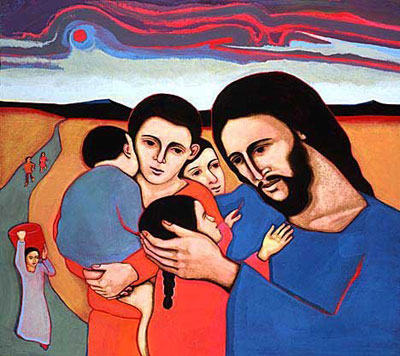November 2009 - Vol. 34
Growing up in the Word "Could not God make people perfect right at the beginning?" someone may ask. Take the example of a very small child. The mother can give her baby grown-up food, but the baby is still unable to take adult nourishment. Similarly, God could given humanity perfection right at the beginning, but humanity could not have received it because it was only a child. For that reason Our Lord, who sums up all things
in himself, when he came on earth in these last days, came not in the full
glory which he could have done, but in a form we could see. Certainly,
he could have come in his imperishable glory, but we should not have been
able to bear the greatness of his majesty.
Irenaeus
(died 202 AD), Against Heresies, 4, 62 (Harvey, P.292)
In God's likeness
Notice that it says: 'God created human beings in his image' and says nothing about likeness. This means that the human race received the dignity of God's image at the beginning of its creation, whereas the perfection of God's likeness is reserved for the end. Human beings must achieve it by imitating God in his works. The possibility of perfection is there right at the beginning by virtue of the image. In the end, human beings will reach perfect likeness by means of their works. This idea has been put forward in a clearer form by the Apostle John. 'Beloved, we are God's children now; it does not yet appear what we shall be, but we know that when he appears we shall be like him, for we shall see him as he is.' [1 John 3:2] He refers to the end of all things and, while simply admitting that the end is as yet unknown, he expresses the hope that we shall be made like God by virtue of our good deeds. Thanks to his intercession for us, we shall proceed from likeness to unity, since in the end 'God will be all in all'. [1 Corinthians 15:28] Origen (185-254
AD), Principles, 3, 6 (PGII, 333)
How Scripture
can teach us to imitate the good deeds of the saints
In this mirror we can see both the ugliness and the beauty of our soul. We can tell what progress we are making or whether we are making any progress at all. Holy Scripture recounts the good deeds of the saints and encourages the hearts of the weak to imitate them. In recording the prowess of the saints, Scripture also underlines our weakness in the face of the onslaught of the vices. But its words ensure that the more the soul sees of the triumphs of so many heroes of the faith, the less it is alarmed in the midst of its own battle. Sometimes, however, Holy Scripture does not only record the victories of the saints but also mentions their defeats, so that we may see from their failures what we ought to be afraid of, besides learning from their triumphs what we ought to aim at. For example, Job is described in the Bible as being exalted by temptation, whereas David is represented as humiliated by it. By this means, our hopes may be nourished by the valor of people in the past, while because of their weakness we may gird on the protection of humility. The victories of the saints give our spirits wings through the joy they cause; their failures give us pause through fear. From Scripture the soul of the reader learns the confidence of hope and the humility of fear. Thanks to the weight of the fear, it does not have the temerity to be proud; but this fear does not cast it into utter despair, because the soul is fortified in the strength of hope by the examples of valor. Gregory the Great (540-604 AD), Commentary on the Book of Job, 2, r (SC3Z, p.r8o) [translation by Thomas Spidlik,
Drinking
from the Hidden Fountain: A Patristic Breviary,, Cistercian Publications,
Kalamazoo, Michigan - Spencer, Massachusetts,1994]
|
. | |
|
(c) copyright 2009 The Sword of the Spirit publishing address: Park Royal Business Centre, 9-17 Park Royal Road, Suite 108, London NW10 7LQ, United Kingdom email: living.bulwark@yahoo.com |
. |
 .
.